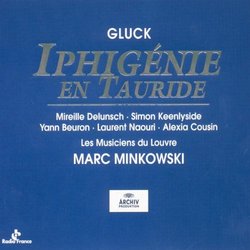The ultimate recording
nicngu | 05/13/2001
(5 out of 5 stars)
"Minkowski and Les Musiciens du Louvre have done it again : there are few baroque ensembles who are able to bring so much life in a recording. Thanks to outstanding singing, playing and directing, this recording of Gluck's masterpiece (his best opera if you ask me !) is truly a theatre experience. This is much better than anything recorded before : the Muti/Scala Sony recording with Vaness was always a bit too "exotic", and the Boston Baroque for Pearlmann (with Goerke) are too boring for words. The Gardiner version (with modern instruments) on Philips was the only recommandable version so far, but Diana Montaigue is no match for Delunsch. What is more, the cast is outstanding. The soloists all have a perfect command of the language (Keenlyside, the only non-native speaker of the cast, included), and, what is more, a perfect understanding the verses they declaim : finally a recording that will not make French ears cringe. Naouri's bass, somewhat lacking in colour, might not be my favourite but is very suitable as the barbaric king Thoas. Beuron's Pylade is generous and moving. Keenlyside's portrayal of the tortured Oreste is breathtaking throughout : there is so much suffering in the voice. Delunsch, whom I found slightly distant in the concert hall, here just blows away any reservations I might have had : her Iphigénie is of classical grandeur and her singing superb... Listen to her big 2nd act aria with choir, the famous "O malheureuse Iphigénie..." and you will be sold ! If you are not moved, this is just not the work for you !"
Exceptionnel
Constantin Declercq | 10/14/2007
(5 out of 5 stars)
"Cette version est la meilleure des versions officielles, et de très loin. Comme d'habitude Minkowski a le sens du théâtre et son orchestre accompagne parfaitement les sentiment exprimés que ce soit l'angoisse ou la méditation. Les chanteurs et les choeurs sont en symbiose parfaite avec cette vision de l'oeuvre, ce qui leur fait éviter le piège de la théâtralité froide. Mireille Delunsch est parfaite : elle compense ce qu'elle n'a pas en puissance (et que le rôle ne demande d'ailleurs pas) par une émotion et une intelligence du rôle rares. De toutes les chanteuses qui ont chanté Iphigénie elle est la plus émouvante et attachante. La clarté de son timbre et son phrasé participent à cette impression. «Ô malheureuse Iphigénie» en devient superbe de sensibilité et d'intensité. Les autres chanteurs sont aussi excellents."


 Track Listings (25) - Disc #1
Track Listings (25) - Disc #1